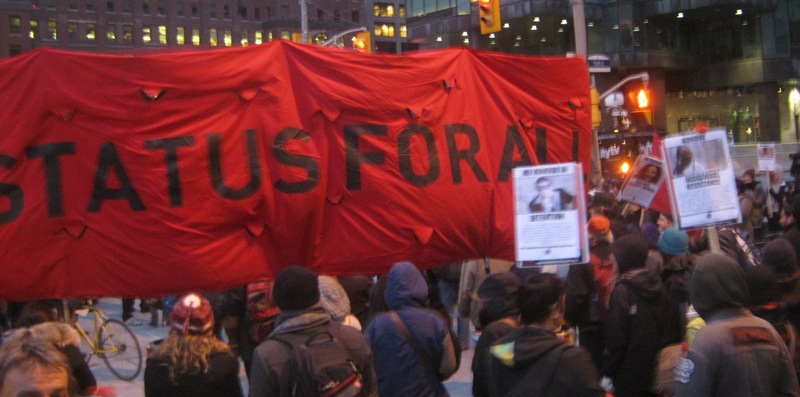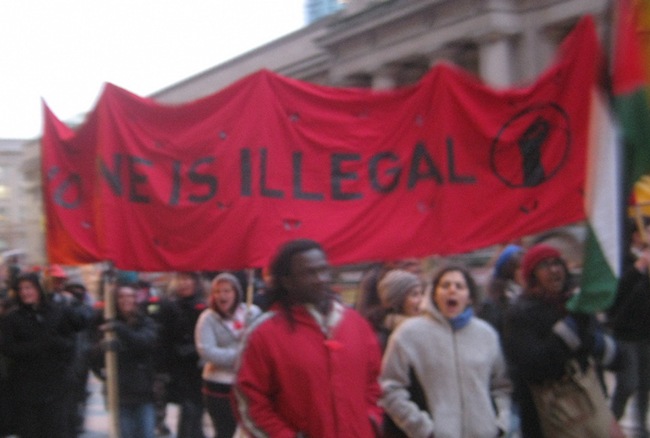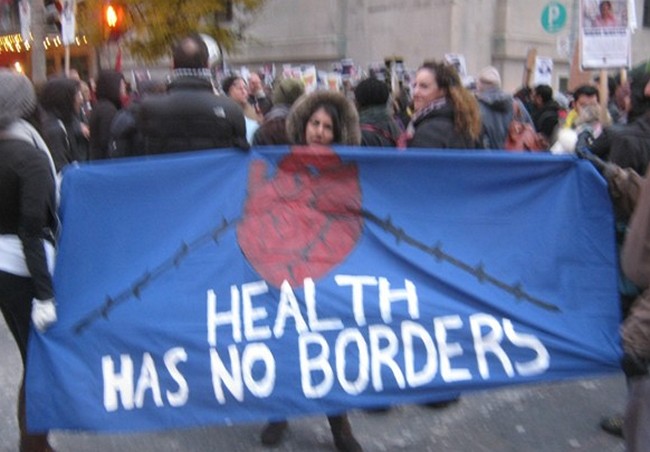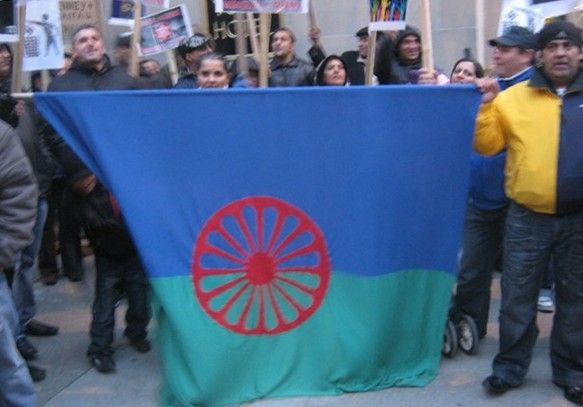
|
November 6, 2012 - No. 140 Harper Government's Economic Auction Plan Prime Minister Leads Team of Salesmen of the Monopolies to India Harper
Government's
Economic
Auction Plan Harper Government's Economic Auction Plan Prime Minister Leads Team of Salesmen of the Monopolies to IndiaContinuing his dictatorship's agenda to wreck Canadian manufacturing and to reduce Canada's economy to shipping out raw resources to as many countries as possible, Prime Minister Stephen Harper is in India this for a six-day visit, November 4-9. Harper is trying to push through a free trade deal, a foreign-investor protection agreement, and a nuclear co-operation agreement. Canadian cabinet ministers have made more than 20 trips to India since 2006. Harper last visited India in 2009 and free trade deal talks were launched in 2010. During the Conservative Party's 2011 election campaign, Harper promised that he would aim for a Canada-India free-trade deal by 2013, however, this is unlikely to happen. A sixth round of Canada-India trade negotiations takes place later this month in Ottawa.
But if India is leery, what about Canada? It has
frequently lost millions of dollars as a result of NAFTA's Chapter 11
and has very negative experience in this regard. Such clauses in no way
serve either the people of India or Canada. The Canada-India nuclear co-operation agreement that was struck two years ago is also at an impasse because of the Harper government's continuous attempts to dictate to India what it can and cannot do, in this case insist on Canada's right to verify that any nuclear material provided by Canada is used for "peaceful purposes." India opposes that insistence as unacceptable interference in its internal affairs, noting that it already reports its activity to the International Atomic Energy Agency. In an exclusive interview with Postmedia News prior to his departure, Harper hinted at lifting this insistence so as to permit the sale of Canadian nuclear reactors and material. In the interview, Harper said he is "confident" progress will be made on the issue, adding that Canada sees "opportunities" for its nuclear industry in India. Indeed, he said Canada is a producer of "virtually all forms of energy" and should be a prime supplier for India. The nuclear monopolies in Canada are pressing for the deal to go forward as soon as possible. In November 2009, Harper held a meeting with key players in India's nuclear energy sector where he was accompanied by senior executives from Atomic Energy of Canada Ltd. (AECL),[1] uranium company Cameco Ltd.[2] and Montreal-based SNC-Lavalin, Canada's largest engineering and construction firm.[3] Harper's Minister of International Trade, Joe Oliver, visited India from October 8-12 with the special aim of pitching the sale of Canada's energy resources to the monopolies which the Indian government champions. According to Oliver, Canada did $5.1-billion worth of trade with India last year, but only $4 million of it was in energy. Oliver's sales pitch emphasized the immensity of Canada's resources such as petroleum, uranium and potash, Canada's "shared values" with India, and how Canada could also supply India with expertise in the development of energy infrastructure. On October 6, Oliver broadly hinted that India was lagging behind in investing in Canada's oilsands which he said would require $650 billion in mostly foreign investment in the next ten years. The same day, a trio of state-run Indian oil companies[4] stated that in July they had bid $5 billion for stakes in undeveloped Alberta oil sands holdings owned by U.S. energy monopoly ConocoPhillips. On October 15, ConocoPhillips announced that the Indian consortium was one of three finalists for the oilsands assets.
In 2009 the Harper
dictatorship launched its so-called Economic Action Plan under the hoax
of "fighting the recession." This should be more aptly named the
Economic Auction Plan because since 2009, the Harperites have been
criss-crossing the globe under the umbrella of "free trade" trying to
find as many
places as possible to auction off Canada's resources. But this agenda
can only lead to economic disaster, especially when combined with the
Harper dictatorship's wrecking of Canada's manufacturing base. What is
needed is self-reliance in the economic sphere, not dependency. A
self-reliant economy is built on a
foundation of manufacturing and the guarantee of the well-being of the
people under all circumstances. It requires that the Canadian people
and First Nations own all natural resources in more than name only.
This means that the people must control and make all decisions that
affect the social economy and the social
and natural environments. The Canadian people, led by the working
class, must put an end to the Harper dictatorship's sellout and
wrecking of the Canadian economy and build in its place an economy that
is based on self-reliance and on trade with other countries for mutual
benefit.
What Harper Had to SayIn an exclusive interview with Mark Kennedy from Postmedia News, Harper said that it's time to "turn the page" on the "very challenging and guarded relationship" Canada has had with India. That relationship became difficult "when that country built its first atomic bomb in 1974 using plutonium from a Canadian-made reactor," Postmedia asserts. "We cannot be stuck in the 1970s," Harper said. "The world is different. This country's needs are different and this country can have a good, positive relationship with India -- and, in my judgment, needs it." Harper said Canada needs to improve its trade and investment in India as part of a broader economic plan to rely less in future on "traditional export markets" such as the United States. "I think India will be a significant world economic power," Harper said. And with an Indian diaspora in Canada of one million
people, it's
important to build on those "social and cultural connections," he said.
"I think India will be a significant world economic power," he added.
Postmedia writes that GDP growth in India last year was 7.2 per cent
and that Harper hopes to triple bilateral trade with India to $15
billion by 2015. Postmedia says Harper cited a "long-term" reason why strengthened ties are so important. "I'd call it almost geopolitical global security. You know, India is in many ways a very different country. But in many ways, if you look at the emerging world, the country is very similar to Canada and to the West. "It's a Commonwealth country. It's a country where English is one of the major languages of business and of interaction. It's a democratic country. It's a country that accepts pluralism." Indeed, said Harper, "very few" of the world's major developing countries have as many similarities to Canada as India does. "That's why countries like Canada and the United States and others have been working on solidifying those relationships. We will need, in the future, deeper relationships and allies in that part of the world." "I think they're a logical partner and ally of western countries they face many of the same security issues that we face. In some ways, more imminently." India has a population of 1.2 billion people and Postmedia repeats the myth that it is "the world's largest democracy" all the while admitting that its government is wracked with scandal and corruption. Similarly, Postmedia presents Harper as a real champion of democracy quoting him saying things he clearly does not practice in Canada. Postmedia writes: "Harper expressed patience with the slow pace of negotiations on a free trade deal and an investor protection agreement. "He said economic reform often moves slowly in India because of the democratic process. "It's hard to simply impose solutions and there are often a lot of barriers to getting things done at the governmental level. "I'm one who happens to believe that democratic institutions, while they may slow things down, actually in the long term produce more robust outcomes with greater social buy-in and more secure long-term economic development."[5]
Notes 1. AECL was founded in 1952 as
a Canadian public corporation with a mandate to develop peaceful uses
of nuclear energy. In 1954 AECL partnered with the Hydro-Electric Power
Commission of Ontario to build Canada's first nuclear power plant at
Rolphton, Ontario, near Chalk River. AECL produced Canada's
first nuclear reactor, the CANDU, which was uranium fuelled and
heavy-water moderated. The first sale of a CANDU reactor was to India
in 1963, followed by another sale in 1966.
All Out to Strengthen Opposition to Anti-Social Anti-National Offensive Why Is the U.S. National Guard Training in Canada?On November 2 the Department of National Defence announced the completion of military exercise "Maple Resolve" in Wainwright, Alberta. The month-long exercise was one of the largest training events in the history of the Canadian Manoeuvre Training Centre and included some 4,000 soldiers, over 15 Canadian Forces units, and members of the U.S. National Guard.
On the occasion of the completion of the exercises, Minister of National Defence Peter MacKay said: "The men and women of our Canadian Forces have yet again shown their professionalism and commitment during this rigorous training. The Government of Canada is committed to ensuring that military personnel are adequately trained for future operational needs." "Exercise Maple Resolve is a challenging training event that focuses on readiness," said Lieutenant-General Peter Devlin, Commander of the Canadian Army. "The Canadian Army is committed to creating and sustaining well-trained, well-equipped and well-led units that can meet any challenge in any environment around the world." "Exercise Maple Resolve was an opportunity to synchronize the Royal Canadian Air Force and Canadian Army training for our high-readiness forces," said Major-General Steve Bowes, Commander of Land Force Doctrine and Training System. "Joint training is critical for success in future deployments." The majority of participating Canadian troops were from Land Force Quebec Area, primarily from five Canadian Mechanized Brigade Groups based in Valcartier, Quebec. Approximately 2,000 of the participating troops now form the new "Task Force 3-12," the high-readiness contingent able to deploy on short notice upon request from the Government of Canada.
Public Outrage over Abuse of Youth by
|
 Ashley Smith |
The entire situation around the tragic death of Ashley shows the Harperites' utter disregard of the fact that the youth caught up in the criminal justice system are human beings. This anti-human outlook goes far beyond a single case. Just as the videos showing Ashley being tormented by CSC were released, Harper's Omnibus Crime Bill C-10 was coming into effect. Bill C-10 provides for even harsher treatment of young people by the justice system than is currently the case. It has been denounced across the country by youth and health workers as an abandonment of troubled youth. The UN has also declared C-10 to be a violation of Canada' commitments under the Convention on the Rights of Children because it "is excessively punitive for children and not sufficiently restorative in nature."[2]
Harper's attempt at cover-up Ashley Smith's death with a claim for impunity for CSC officials along with the Harperites' whole youth justice agenda demonstrates the most profoundly arrogant hypocrisy of the "law and order" ideologues -- impunity granted to the powerful and privileged while the crushing force of the law is used against the most vulnerable and disadvantaged.
Notes
1. The Keable Commission was a
Quebec government investigation of terrorist crimes committed by the
RCMP throughout Quebec at the time of the FLQ crisis. The Supreme Court
blocked the Keable Commission from subpoenaing federal documents which
prevented the full extent of the arson, bombings and
other terrorist acts carried out by the RCMP from being investigated.
2. For the full report on Canada by
the Sixty-first Session of United Nations Committee on the Rights of
the
Child see: http://rightsofchildren.ca/wp-
content/uploads/Canada_CRC-Concluding- Observations_61.2012.pdf
Demonstration Against Inhuman Immigration Policies

 On November 4 in Toronto
hundreds of people demonstrated
to oppose an event organized by Israeli Zionists to honour Citizenship
and Immigration Minister Jason Kenney. Kenney was being honoured by
Israel's Haifa University for his work to strengthen the ties between
the Harper dictatorship and the Israeli
state terrorists. The event was a fundraiser for the "Jason Kenney
Holocaust Education Fund" which will be used to distort the history of
World War II, to promote Hitlerite anti-communism and to justify the
genocide committed by Israeli Zionism and U.S. imperialism against the
Palestinian
people.
On November 4 in Toronto
hundreds of people demonstrated
to oppose an event organized by Israeli Zionists to honour Citizenship
and Immigration Minister Jason Kenney. Kenney was being honoured by
Israel's Haifa University for his work to strengthen the ties between
the Harper dictatorship and the Israeli
state terrorists. The event was a fundraiser for the "Jason Kenney
Holocaust Education Fund" which will be used to distort the history of
World War II, to promote Hitlerite anti-communism and to justify the
genocide committed by Israeli Zionism and U.S. imperialism against the
Palestinian
people.
Demonstrators denounced both
the inhuman immigration policy of the Harper dictatorship and its
support for Israeli crimes against the Palestinians. More than 300
people
participated in the action organized by No One Is Illegal, other
immigrant rights organizations, student and community organizations and
organizations supporting the struggle of
the Palestinian people. It began with a rally at Pecaut Square which
was followed by a march through the downtown core to the Royal York
Hotel where the Harperite-Zionist event was being held. Among those
participating was a large delegation of Toronto's Roma Community and
health care professionals of Health
for All who were protesting against recent changes to the recently
passed Bill C-31, the Balanced
Refugee Reform Act. This act
excludes refugees seeking asylum from persecution in countries Canada
is allied with under the hoax that these are "safe countries."
Among
the groups this measure is directed against
are the Roma people facing persecution in Europe by Canada's NATO and
EU allies. Health for All along with other health care professionals
across the country are opposing the inhuman measures being implemented
under C-31 which excludes refugees from access to health care. They are
demanding that the government
recognize health care as the fundamental right of every human being,
regardless of their immigration status.


Participants in the action included Health for All (left) to oppose cuts to health care for refugees and members of the
Toronto Roma Community (right) to denounce the “safe country” hoax of the Harper government’s Bill C-31.
Need to Oppose Expansion of Canadian Experience Category Immigration

According to Citizen and Immigration Canada (CIC)'s 2012 Annual Report to Parliament tabled by Immigration Minister Jason Kenney on October 31, the immigration quota for the Canadian Experience Class (CEC) will be expanded significantly in 2013. Speaking at a press conference in Ottawa on October 31, Minister Kenney stated that the Harper government was "pursuing significant immigration reforms to do a better job of selecting people with the capacity quickly to contribute to our economy." He stated that "the best reform" he has made has been "the Canadian Experience Class, which invites qualified foreign students who have completed two years towards a degree or diploma and have done one year of work in Canada, or higher-skilled foreign nationals who have completed one year of work on a work permit in Canada, to stay permanently and to get permanent residency on a fast-track basis."
Since its introduction in 2008, the CEC program has grown steadily from 2,500 immigrants in 2009 to a projected 10,000 next year.
In his speech, Kenney pointed out that the Harper government is working closely with Canadian colleges and universities to provide more "opportunities" for foreign students with the view of extending to those qualified among them, especially doctoral students, the chance to remain in Canada and become "model immigrants." According to Kenney, such "model immigrants" are those who have a degree or diploma recognized by Canadian employers, have better languages skills in English or French, and for those reasons, would easily find employment or start businesses.
It is also reported in the media that according to Kenney, this reform in immigration would ensure Canada's future prosperity and competitiveness in the global economy by putting the selection of immigrants in the hands of business. It was reported in the Calgary Herald on November 1, that Kenney had previously stated that: "Employers are best positioned to decide who can best fill the open jobs rather than a passive and bureaucratic system...it is not about privatizing the immigration system, it is a more active role of recruitment for people so they have jobs when they show up. I would rather have an engineer working as an engineer than as a cab driver."
 Kenney also hinted that in
the coming period, the CEC
program will continue to be expanded as the main pipeline of
Canadian immigration, while traditional paths to immigration to Canada
such as the Federal Skilled Worker category, family reunion and the
points-based system will be restricted. In the meantime,
the government has started to eliminate a backlog of some 280,000
applicants from the pre-2008 period who applied to come to Canada
through the Federal Skilled Worker category by refunding them $130
million in processing as announced as part of the Economic Plan 2012,
in order to create what Minister Kenney
called a more "nimble" immigration policy that is responsive to
Canada's economic needs. Many of those affected, who have waited for
five years or more to immigrate to Canada have launched a class action
suit against the government.
Kenney also hinted that in
the coming period, the CEC
program will continue to be expanded as the main pipeline of
Canadian immigration, while traditional paths to immigration to Canada
such as the Federal Skilled Worker category, family reunion and the
points-based system will be restricted. In the meantime,
the government has started to eliminate a backlog of some 280,000
applicants from the pre-2008 period who applied to come to Canada
through the Federal Skilled Worker category by refunding them $130
million in processing as announced as part of the Economic Plan 2012,
in order to create what Minister Kenney
called a more "nimble" immigration policy that is responsive to
Canada's economic needs. Many of those affected, who have waited for
five years or more to immigrate to Canada have launched a class action
suit against the government.
In response to these announcements by Minister Kenney, the Migrant Workers' Alliance for Change -- an umbrella group of unions, migrant worker defence organizations and social justice organizations -- have opposed these arbitrary measures, noting that while Minister Kenney was opening the door to some 10,000 students and temporary workers with the opportunity to become permanent residents, nothing is being done to protect the rights of the remaining 290,000 temporary workers who are brought to Canada every year "to be scammed by recruiters, exploited by bad bosses, separated from their loved ones and then sent back just as they've begun to lay roots." The Alliance noted that the vast majority of Canadian people are opposed to the exploitation and abuse of foreign temporary workers and want a just immigration system in Canada that treats all workers with dignity.
(With files from: CBC, Calgary Herald, Migrant Workers' Alliance for Change, Citizenship and Immigration Canada)
Canada's Hooliganism Knows No Bounds
 TML denounces the
ruling of the Ontario Superior Court of
Justice which last week temporarily froze the Government of Iran's
assets in Canada. The ruling was made at the behest of
the family of an American, Marla Bennett, who was killed in a Jerusalem
bombing 11 years ago
that was said to be the work of Hamas. The Bennett family won a default
judgment against Iran in a U.S. court for $12.9 million under the hoax
that Hamas is financed by Iran. Despite the verdict, the family was
unable to collect and it is now trying to enforce the judgement with
Iranian assets in Canada.
TML denounces the
ruling of the Ontario Superior Court of
Justice which last week temporarily froze the Government of Iran's
assets in Canada. The ruling was made at the behest of
the family of an American, Marla Bennett, who was killed in a Jerusalem
bombing 11 years ago
that was said to be the work of Hamas. The Bennett family won a default
judgment against Iran in a U.S. court for $12.9 million under the hoax
that Hamas is financed by Iran. Despite the verdict, the family was
unable to collect and it is now trying to enforce the judgement with
Iranian assets in Canada.
Even though it is still not clear whether the court will allow the family to seize the properties which belong to the Government of Iran, which includes Iran's embassy in Ottawa, two former cultural centres and a diplomatic residence, it is once again clear that Canada's hooliganism has gone beyond the pale and it must be stopped before it causes even more damage to the rule of law nationally and internationally.
Iranian Foreign Ministry spokesman, Ramin Mehmanparast, said Iran held Canada's government responsible for the court order. The Islamic Republic News Agency quoted Mehmanparast as saying "the political motivations behind such a move are not hidden to anybody."
Canada severed diplomatic ties with Iran in September as part of the formation of a warmongering alliance with Israel. This alliance is causing grave dangers which the working class and people of this country are duty-bound to stop.
Read The Marxist-Leninist
Daily
Website: www.cpcml.ca
Email: editor@cpcml.ca
 Neo-liberal
foreign-investor protection agreements attack national sovereignty by
granting foreign companies the right to sue for compensation if a free
trade agreement is "violated." (Treaties may
include "exception clauses," e.g., in regard to matters deemed to
involve "national security.") India's well-warranted caution on
this front may be explained by the fact that in recent years it has
been hit by a number of investor-state suits by foreign monopolies who
are demanding India give compensation under some of the over 80
bilateral investment treaties that India has signed in recent years.
Suits have been launched by British telecom
monopoly Vodafone, Russian conglomerate Sistema and Norwegian telecom
monopoly Telenor. Industries Australia recently won a partial
settlement of $4 million in a case that began in 2002.
Neo-liberal
foreign-investor protection agreements attack national sovereignty by
granting foreign companies the right to sue for compensation if a free
trade agreement is "violated." (Treaties may
include "exception clauses," e.g., in regard to matters deemed to
involve "national security.") India's well-warranted caution on
this front may be explained by the fact that in recent years it has
been hit by a number of investor-state suits by foreign monopolies who
are demanding India give compensation under some of the over 80
bilateral investment treaties that India has signed in recent years.
Suits have been launched by British telecom
monopoly Vodafone, Russian conglomerate Sistema and Norwegian telecom
monopoly Telenor. Industries Australia recently won a partial
settlement of $4 million in a case that began in 2002. During his visit to India,
Harper will also speak in
Delhi at the opening of the World Economic Forum (WEF), the first time
it has
met on the Indian subcontinent. Founded in 1971 and headquartered in
Geneva, Switzerland, the WEF began as an organization of Western
European monopolies but now represents and
is funded by the 1,000 largest monopolies in the world. It meets
annually in Davos Switzerland where thousands of demonstrators always
gather to militantly and justly protest the meetings as against the
interests of the world's people. In 2007, the WEC established the
Annual Meeting of the New Champions, held
annually in China, bringing together 1,500 monopolies from countries
such as Brazil, Russia, India, and China (BRIC). Harper's itinerary
makes it clear that the main purpose of his visit is to continue in his
role as salesman for the monopolies by opening up new opportunities for
the plunder of Canada's resources.
During his visit to India,
Harper will also speak in
Delhi at the opening of the World Economic Forum (WEF), the first time
it has
met on the Indian subcontinent. Founded in 1971 and headquartered in
Geneva, Switzerland, the WEF began as an organization of Western
European monopolies but now represents and
is funded by the 1,000 largest monopolies in the world. It meets
annually in Davos Switzerland where thousands of demonstrators always
gather to militantly and justly protest the meetings as against the
interests of the world's people. In 2007, the WEC established the
Annual Meeting of the New Champions, held
annually in China, bringing together 1,500 monopolies from countries
such as Brazil, Russia, India, and China (BRIC). Harper's itinerary
makes it clear that the main purpose of his visit is to continue in his
role as salesman for the monopolies by opening up new opportunities for
the plunder of Canada's resources.

 According to a DND
statement, Exercise Maple Resolve
provided soldiers "the opportunity to practice conventional
war-fighting skills, preparing them for a wide range of operations."
Why the U.S. National Guard is training in Canada to practice
"war-fighting skills" was not explained in the statement. The placement
of U.S. troops in Canada is becoming more and more common. In this case
it is the U.S. National Guard. Following the 9/11
attacks the Liberal government signed
an agreement with the United States permitting U.S. troops to enter
Canada in the case of an "emergency." (It was 50,000 National Guard
that were
mobilized during Hurricane Katrina in New Orleans during the
militarized response to that humanitarian disaster.) It appears as if
they are now
entering Canada to train for an as yet defined "emergency." This should
concern all Canadians as the U.S. military is an aggressive force
trained to carry out U.S. Imperialist war
crimes at home and abroad.
According to a DND
statement, Exercise Maple Resolve
provided soldiers "the opportunity to practice conventional
war-fighting skills, preparing them for a wide range of operations."
Why the U.S. National Guard is training in Canada to practice
"war-fighting skills" was not explained in the statement. The placement
of U.S. troops in Canada is becoming more and more common. In this case
it is the U.S. National Guard. Following the 9/11
attacks the Liberal government signed
an agreement with the United States permitting U.S. troops to enter
Canada in the case of an "emergency." (It was 50,000 National Guard
that were
mobilized during Hurricane Katrina in New Orleans during the
militarized response to that humanitarian disaster.) It appears as if
they are now
entering Canada to train for an as yet defined "emergency." This should
concern all Canadians as the U.S. military is an aggressive force
trained to carry out U.S. Imperialist war
crimes at home and abroad. In 2007 Ashley Smith died while in
custody at the Grand
Valley Institution for Women, after being kept permanently in solitary
confinement and being repeatedly drugged against her will. To
contravene regulations prohibiting subjecting a prisoner to continuous
solitary confinement for more than 60 days, CSC
transferred Smith 17 times to federal prisons all across the country
during an 11-month period. This subterfuge by CSC made it impossible
for Smith to receive the mental health treatment she urgently required.
In 2007 Ashley Smith died while in
custody at the Grand
Valley Institution for Women, after being kept permanently in solitary
confinement and being repeatedly drugged against her will. To
contravene regulations prohibiting subjecting a prisoner to continuous
solitary confinement for more than 60 days, CSC
transferred Smith 17 times to federal prisons all across the country
during an 11-month period. This subterfuge by CSC made it impossible
for Smith to receive the mental health treatment she urgently required.